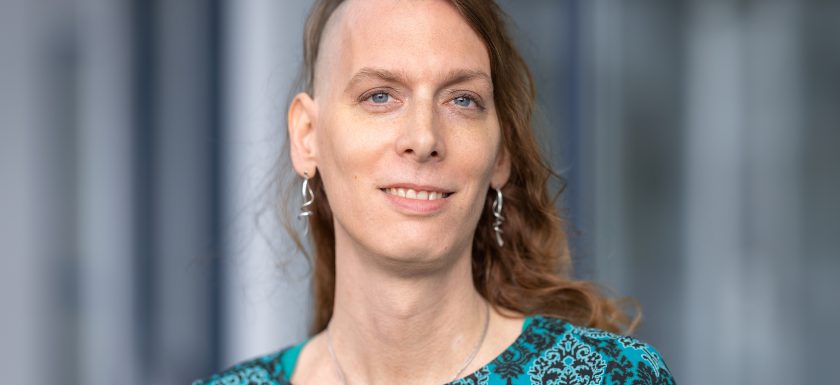
Physicist Dr Nomi Sorgenfrei develops methods and instruments for research with X-ray light at BESSY II at HZB and investigates catalytically active thin films herself. A conversation about privileges, diversity at work, and intersectional forms of discrimination.
What is particularly important to you when it comes to diversity?
The appreciation of all people with their different backgrounds, whether cultural, religious or gender. We all just want to have a good life and contribute to society. And it is very good when people with different perspectives contribute.
At what points in your work does diversity play a role?
Very practically in the daily encounter with people from an international context. That is really the main part. There, culture and religion also come into play, which shape us differently in each case. When it comes to hosting an event, for example, I think it’s important to consider that some cultures don’t eat pork or that many people today are vegan or vegetarian.
When did it help you that there are different opinions on a topic?
During my doctorate, I worked in Japan and in Stanford, USA, which was very different from my German environment back then at DESY. But the most was during my Coming-Out in 2019: That’s when I really started engaging in the queer scene for the first time, got to know women from Russia, Africa, or South America. And I realised what privileges I bring with me as a white, Western European woman. And also, what privileges I had for decades, when I was still perceived as a man. I hadn’t seen them at all, I had been blind. Many people are like that: You don’t see your own privileges; they are blind spots. But as a woman I could notice the difference, this staring, this aggression that suddenly came from strangers. I think that changed me; I reflect that more now.
When and where has there been friction?
I see identity politics in its exaggerations. People worry that everyone will only stand for themselves and put their own self-realisation as an absolute. People who previously had privileges, for example as a white cis man who is also heterosexual, now also have to give up power, lose the ability to decide how the world is being interpreted. It may feel like everything is falling apart. But it’s good that everyone wants to get involved, it is basically what moves society forward.
Which aspect of diversity (origin, gender, age, disability, sexual orientation, religion) should HZB be more committed to?
Discrimination is often intersectional. This means, you are not taken seriously or discriminated against because you are a woman, non-white and not straight, or because your social background is different, or you do not have a university degree. Or even a chronic illness or disability. And these dimensions reinforce each other. All this is not good and prevents us from listening to all people and learning from them. That’s why I wouldn’t single out any one aspect, it’s all important.
The interview was conducted by Antonia Rötger.
Translation by Ribal Zeitouni.
What does intersectional discrimination mean?
In short, in intersectional discrimination, different marginalised characteristics (i.e. the characteristics due to which a person suffers from structural and normative discrimination) overlap within a person and then mutually influence each other[1]. In this process, new forms of discrimination emerge for those affected, which only result through the overlapping and interaction of their characteristics. Examples of intersectional discrimination include:
- Trans* people who are unable to begin the process of transition due to the wrong citizenship or lack of (financial) resources.[1]
- A refugee family dependent on public welfare that has hardly any chance on luck in the housing market.[2]
- The precarious situation of illegal migrant women as housekeepers in Western Europe.[3]
What these examples have in common is that the discriminatory situations described cannot be broken down and analysed by their individual aspects – intersectional discrimination is a multidimensional approach that makes it possible to draw a more complete picture and better identify the need for action to fight against discrimination.
Written by Ribal Zeitouni.
Sources:
- Fütty, Tamás Jules; Höhne, Marek Sancho; Llaveria Caselles, Eric (2020): Geschlechterdiversität in Beschäftigung und Beruf. Bedarfe und Umsetzungsmöglichkeiten von Antidiskriminierung für Arbeitgeber_innen. Herausgegeben von der Antidiskriminierungsstelle des Bundes. Berlin. (Seiten 25-38)
- https://www.antidiskriminierungsstelle.de/EN/about-discrimination/what-is-discrimination/forms-of-discrimination/forms-of-discrimination-node.html
- Lutz, Helma: Intime Fremde: Migrantinnen als Haushaltsarbeiterinnen in Westeuropa, in: L’ homme : Zeitschrift für feministische Geschichtswissenschaft, Jg. 18 (2007) Nr. 1, 61-77. DOI: https://doi.org/10.25595/1053.
This blogpost is part of a series on Diversity. You can find further articles here.
